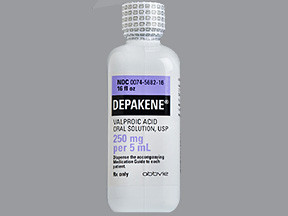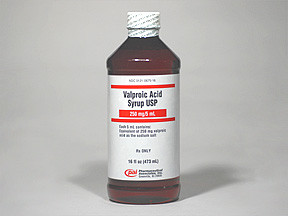VALPROATE SODIUM SYRUP - ORAL
PHONETIC PRONUNCIATION: (val-PRO-ate SO-dee-um)
COMMON BRAND NAME(S): Depakene
GENERIC NAME(S): valproic acid (as sodium salt) (valproate sodium)
Uses
USES: This medication is used to treat seizure disorders, mental/mood conditions (such as manic phase of bipolar disorder), and to prevent migraine headaches. It works by restoring the balance of certain natural substances (neurotransmitters) in the brain.
How to use VALPROATE SODIUM SYRUP - ORAL
HOW TO USE: Read the Medication Guide and, if available, the Patient Information Leaflet provided by your pharmacist before you start taking valproate sodium and each time you get a refill. If you have any questions, ask your doctor or pharmacist. Take this medication by mouth as directed by your doctor. You may take it with food if stomach upset occurs. Use a specially marked device to measure the correct amount of medication. Valproate sodium syrup should not be mixed with carbonated drinks because it may irritate the mouth and throat. The dosage is based on your age, weight, medical condition, response to treatment, and other medications you may be taking. Be sure to tell your doctor and pharmacist about all the products you use (including prescription drugs, nonprescription drugs, and herbal products). Use this medication regularly in order to get the most benefit from it. Remember to use it at the same time each day to keep the amount of medication in your blood constant. If this medication is used for seizures, do not stop taking it without consulting your doctor. Your condition may become worse if the drug is suddenly stopped. Your dose may need to be gradually decreased. This medication does not relieve acute migraine headaches. Take other medications as directed by your doctor for acute attacks. Inform your doctor if your condition does not improve.
Side Effects
Precautions
Interactions
Overdose
Images
Reviews
Faq for VALPROATE SODIUM SYRUP - ORAL
Valproate Sodium Syrup is used to treat certain types of seizures, bipolar disorder, and to prevent migraine headaches.
Valproate Sodium works by increasing the levels of certain chemicals in the brain that help to control seizures and stabilize mood.
Take Valproate Sodium Syrup exactly as prescribed by your doctor. Usually, it is taken by mouth, usually 2 to 3 times daily with food to decrease stomach upset.
Common side effects may include nausea, vomiting, stomach upset, drowsiness, dizziness, and loss of appetite. However, if you experience any severe side effects such as unusual bleeding or bruising, fever, rash, or persistent stomach pain, seek medical attention immediately.
Valproate Sodium Syrup may cause harm to an unborn baby, especially during the first trimester. It is important to discuss the potential risks and benefits with your doctor if you are pregnant or planning to become pregnant while taking this medication.
Valproate Sodium Syrup may interact with other medications, including birth control pills, blood thinners, antidepressants, and antipsychotic medications. It is essential to inform your doctor about all the medications you are currently taking to avoid any potential interactions.
Yes, Valproate Sodium Syrup can be used in children, but the dosage may vary based on their weight and condition. It is important to follow the instructions provided by the doctor or pharmacist for the correct dosage.
The response to Valproate Sodium Syrup varies from person to person. It may take a few weeks to notice a significant improvement in seizures or mood stability. It is important to continue taking the medication as prescribed by your doctor, even if you feel well.
No, Valproate Sodium Syrup should not be abruptly stopped without consulting your doctor. Sudden discontinuation may increase the risk of seizures or other withdrawal symptoms. Your doctor will gradually reduce the dosage to safely discontinue the medication if needed.
Warning
WARNING: Rarely, this medication has caused serious (sometimes fatal) liver problems, usually within the first 6 months of starting treatment. Laboratory tests should be performed before you start treatment and periodically during treatment, especially within the first 6 months, to monitor this side effect. The risk of serious liver problems is increased in children younger than 2 years, especially if they have an inherited metabolic disorder, severe seizure disorder with mental retardation, organic brain disease, or if they take more than one seizure medication. Talk with the doctor about the risks and benefits of using this medication in children younger than 2 years. Due to an increased risk for liver problems, people with certain inherited metabolic disorders (such as Alpers-Huttenlocher syndrome) should not use this medication. Children younger than 2 years who might have these disorders should not use this medication. Children older than 2 years who might have these disorders should be closely monitored during treatment with valproate sodium. Talk to your doctor for details. This medication has rarely caused severe (sometimes fatal) disease of the pancreas (pancreatitis). This may occur at any time during treatment and can quickly worsen. Tell your doctor right away if you develop symptoms of liver problems or pancreatitis such as unusual tiredness, weakness, swelling of the face, stomach/abdominal pain, loss of appetite, dark urine, yellowing eyes/skin, or persistent nausea/vomiting. Taking this medication during pregnancy can cause birth defects and may lower your child's IQ. Women of childbearing age should discuss the risks and benefits of this medication, other treatment options, and use of reliable forms of birth control with their doctor. If you are planning pregnancy, become pregnant, or think you may be pregnant, immediately talk to your doctor. If you are taking valproate sodium only to prevent migraine headaches, this medication must not be used during pregnancy. If you are taking valproate sodium to treat seizures or mental/mood problems (such as bipolar disorder), do not stop taking this medication unless directed by your doctor. Untreated seizures and mental/mood problems (such as bipolar disorder) are serious conditions that can harm both a pregnant woman and her unborn baby.
Disclaimer
IMPORTANT: HOW TO USE THIS INFORMATION: This is a summary and does NOT have all possible information about this product. This information does not assure that this product is safe, effective, or appropriate for you. This information is not individual medical advice and does not substitute for the advice of your health care professional. Always ask your health care professional for complete information about this product and your specific health needs.



No Reviews Yet